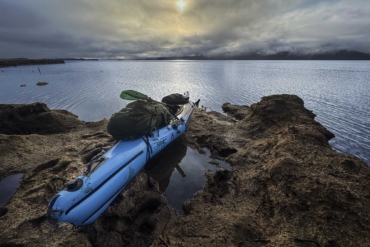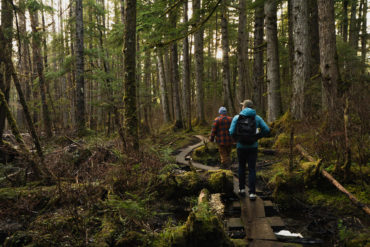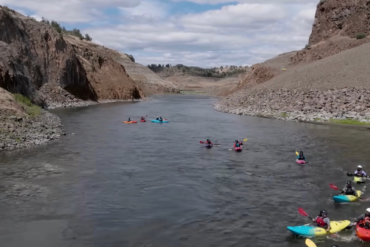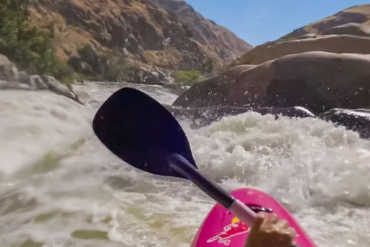After 34 days at sea, a four-woman rowing team arrived in Hawaii this week, delivering on their plan to set a new record in The Great Pacific Race.
A rowing team of four women stepped off their boat in Hawaii on Tuesday to cheers and tears from the hundreds of friends and family gathered to greet them.
After leaving San Francisco on June 21, they rowed across the Pacific Ocean in 34 days, 14 hours, and 11 minutes to arrive in Honolulu on July 26. They shaved nearly a full day off the previous 2,400-mile Guinness World Record for women rowers covering the span. “Ocean Sheroes” set the old mark in 2021.
The four rowers — Libby Costello, Sophia Denison-Johnston, Brooke Downes, and Adrienne Smith — completed the journey as part of team Lat35. None of them had ever rowed in the open ocean before this race.
“I think something that I want people to take away is that these women are so incredible,” Downes told Good Morning America after the race. “But we’re not superhuman. There’s nothing that we were born with that makes us any different.”

Harrowing Trek
The Great Pacific Race requires enormous mental and physical endurance to complete. The team rows in pairs for 2-hour shifts at a time — for the entire voyage across the Pacific.
Days before the end of the journey, Lat35 reported that no member of the squad had slept longer than 90 minutes at a stretch since they left California; they were too busy rowing. They put in over 400 hours each at the oarlocks.
Unforgiving dietary requirements resulted. The rowers reportedly ate 4,000-6,000 calories per day for the duration of the voyage. Sometimes, they resorted to eating nutrient-dense (if highly unappetizing) baby food.
Along the 2,400-mile way, seas were not always friendly. The team rowed through the path of multiple hurricanes, and relied on their small but highly attenuated boat for safety.
In its specific shape, the women’s carbon fiber boat was measurably stronger than steel, Lat35 said. If conditions got bad enough, they would lock themselves in their bombproof cabins and wait it out.
But what would happen in the more-than-a-little horrifying circumstance that the boat tipped over? Boats like the one the team used actually resist capsizing with their special designs. And if seas would have become heavy enough to capsize them, the boat’s self-righting capability presumably would have done its job.
Topside, the women wore harnesses and stayed within reach via various emergency communications systems.
A Supportive Following
Yet despite the journey’s difficulty, it also takes place in the age of social media. The rowers made Instagram posts throughout the trip, building a loyal following through their casual and supportive attitude.
A post from July 9, for example, shows two of them swimming and smiling in the open ocean. It’s necessary to periodically remove the barnacles that build up on the hull, they explained. The sticky crustaceans can slow down the boat by as much as half a knot (or up to 25% of the boat’s total speed).
But even when explaining such practicalities, the women often returned to the idea of fellowship.
“The ability to be able to dive into 15,000-foot deep blue water 1,000 miles from any piece of land with your friends is something that so few people have ever done and something so exhilarating and morale boosting, that it is an opportunity not to be missed!”
The attitude clearly resonated with their online spectators.
“Your ability to tell their story is amazing and inspiring,” one commenter wrote. “I love reading the updates. Row that damn boat ladies!”
View this post on Instagram
Coming Home
Part of any grueling journey’s definition is the return home, and this was no exception. Minutes after Adrienne Smith stepped off the boat, she fell to the ground to embrace her young daughter Reese. After a month away from one another, they were still clinging together when the camera finally moved away.
“After being separated for many weeks, that reuniting of mother and child will perhaps be one of the most powerful shared memories they have in future,” Lat35 wrote on its Instagram page. “So now it’s very much Mom and Reese time — sampling the sweet treats of Hawaii, and chatting endlessly about rowing, sea creatures, and of course, unicorns.”
As the women’s following grew, they used their platform to promote the Anxiety & Depression Association of America. Throughout the trip, and especially now that it’s over, the four rowers have asked their supporters to donate.
Learn how to contribute on the association’s website.
These “remarkable women” are still readjusting to land, Lat35 wrote. So for now, “we’ll be giving them a little break, a little privacy, so they can enjoy their moment.”








